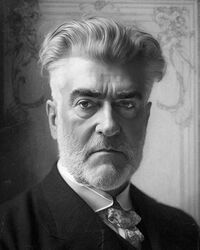Beranism
This article is incomplete because it is pending further input from participants, or it is a work-in-progress by one author. Please comment on this article's talk page to share your input, comments and questions. Note: To contribute to this article, you may need to seek help from the author(s) of this page. |
Beranism is an ontologically monistic moral philosophy which serves as the de facto state philosophy of the Prime Republic of Ostrozava. It originates from the works of early 20th-century Ostrozavan philosophers Vlastimil Beran and Julius Jahoda. Existing in relation to ideas derived from Wernerism, Beranism instead focuses on metaphysical issues such as free will, the nature of the Absolute, and the meaning of life, asserting idealistically that Wernerist materialism was incompatible with psychological discoveries about psychological needs and that to address class struggle is to use idealism and materialism in equal amounts. In writing, Beran referred to his work as aiming to find "global consensus on conceptions of class neeeds"; Beran and Jahoda both did not frame their philosophies as a formulation, but rather as a discovery of existing natural systems.
Concieved after members of the Wernerist Ostrozavan academic underground went on a "journey of discovery" across the world in the mid-late 1890s, Beranism was the result of syncretic and vigorous scientific examination of the world's various religions. For Beran, the focal point of interest became the native religions of Norumbia, particularly the belief in the Great Mystery varyingly espoused by Wakatan, Quanitigan, Kahnawà꞉ke, and Okomi peoples in Enyama, Wahzeganon, Monaxey and Gristol-Serkonos, since, according to Beran, these religions had much in common with other religions' early forms. Beran is widely considered to be one of the pioneers in the fields of comparative mythology andcomparative religion, with his seminal work, The Universal Rhythm, continuing to influence philosophers and storytellers today. Jahoda, on the other hand, had become fascinated with the principles of enlightenment-based faiths, such as the Enyamo-Tsurushimese Furozin and the Dharmacakra faith of Ayvana and Jhengtsang. Upon returning to Karsko, various activists which had taken their own individual journeys abroad coalesed in the Three Forks Tavern (Ostrozavan: Hospoda Třividlice), where several intense philosophical discussions took place, attempting to outline commonalities observed between the individual members' observations about global religion, and the infant but revolutionary academic fields of psychology and quantum theory, specifically the observer effect, which Beran viewed as disproof of pure materialism that suggested the existence of pure consciousness.
Fascinated by the discussions, Beran and Jahoda saw that the other members of the Drinking Club, such as Vladan Vítek, had taken a more immediate interest in the emancipatory struggle, by 1900 already attempting to organize the 1st Worker's Convention, in the nascent beginnings of the Crimson Revolution. Seeing the infant movements beginning to take steam, but taking note that the vast majority of the Ostrozavan people had "split between fanaticism or cynical indifference", Beran and Jahoda began writing O Původu Boha (Ang: On the Origin of God), widely considered to be the central text of what became Beranism.
Beranism has had a profound impact on global academia, having influenced many fields, including archaeology, art history and theory, anthropology, media studies, science studies, political science, theater, history, sociology, cultural studies, education, economics, ethics, criminology, geography, literary criticism, film theory, psychology, and philosophy.

